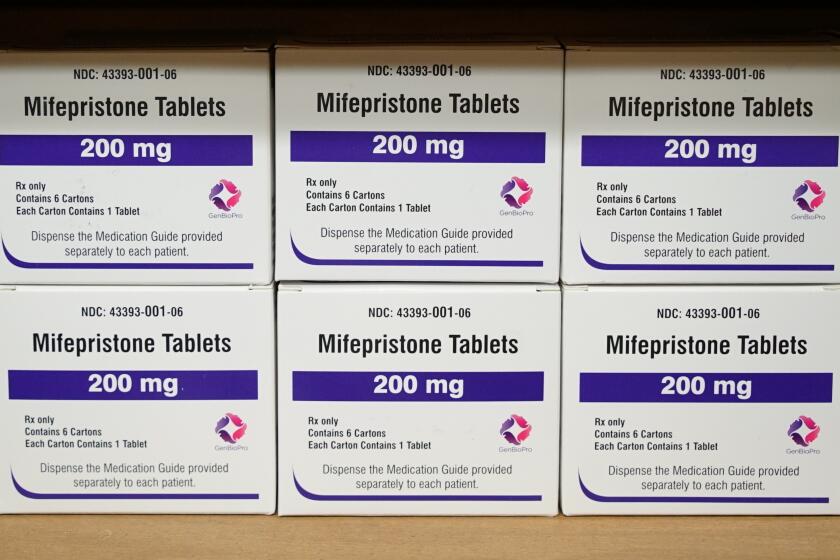Walgreens, CVS plan to get certified to offer abortion pill

- Share via
Walgreens Boots Alliance and CVS Health plan to seek U.S. certification to dispense the abortion pill, moves that could dramatically widen access to thousands of pharmacies in the parts of the country where abortion remains legal.
The U.S. Food and Drug Administration has been under pressure to loosen decades-old restrictions on abortion pills, which until recently could only be distributed in healthcare settings such as doctor’s offices or hospitals. The move this week means brick-and-mortar pharmacies will be able to dispense the pills for the first time, pending a certification not required for most drugs.
“This news confirms what we have said all along, this medication can and should be treated the same as other FDA-approved medications,” Kirsten Moore, director of the Expanding Medication Abortion Access Project, said.
Rite Aid is still reviewing the FDA’s recent action and remains committed to complying with federal and state law, a spokesperson said in an email.
Challenges persist
The quick announcements on Wednesday from Walgreens and CVS, the nation’s biggest pharmacy chains, were a surprise to some experts, who had expected the decision might take longer.
U.S. health officials have finalized a rule change that allows women seeking abortion pills to get them through the mail.
After Walgreens said it would pursue certification, Greer Donley, associate professor at the University of Pittsburgh School of Law who specializes in abortion policy, said other companies might “wait to see how significant the backlash is, if there is any.”
There wasn’t much financial incentive for pharmacies to do so for a drug “that’s unlikely to make that much money and that has the potential to really cause them a lot of problems,” Donley added.
Companies will still have to navigate a patchwork of thorny state laws that continue to prevent some patients from getting their hands on the pill despite the FDA moving to ease access. Allowing pharmacies to dispense the drug “doesn’t do a lot for expanding access dramatically in the banned states,” said Elizabeth Nash, principal policy associate for states issues with the Guttmacher Institute, an abortion research group.
Some states have added specific restrictions that curtail access to medication abortions. Arizona, Texas and Arkansas, for example, ban people from getting the pill by mail. At least seven states introduced legislation last year that, if passed, would bar medication abortions altogether, while others moved to block mail-order prescriptions or impose restrictions on telehealth providers, according to research from Guttmacher.
“We are anticipating some of the states that are fairly conservative, but have not banned abortion, will try to restrict access to care in these upcoming legislative sessions,” Nash added.
Health providers can and should stop sending so much of your information to tech companies.
Deep divisions over abortion in the U.S. were once again on full display as pharmacies indicated that they would apply for certification. While advocacy groups cheered the decision, others that oppose abortions were quick to criticize it.
“The Biden administration has once again proved that it values abortion industry profits over women’s safety and unborn children’s lives,” the group SBA Pro-Life America said in a statement.
Certification process
Getting the policy through is often the first step, but implementation could be a bumpy road, said Alina Salganicoff, senior vice president and the director of Women’s Health Policy at Kaiser Family Foundation. It will be important to pay attention to how companies handle possible confidentiality issues that arise both for those writing the prescriptions and patients picking them up.
In order to be certified, pharmacies must commit to protecting this confidential information, experts said. The certification process is not particularly onerous and the drug has a long-standing safety record, Salganicoff said. Plus, chain pharmacies have had time to prepare because the FDA indicated it would ease restrictions on mifepristone more than a year ago.
Walgreens said it’s “working through the registration, necessary training of our pharmacists, as well as evaluating our pharmacy network in terms of where we normally dispense products that have extra FDA requirements and will dispense these consistent with federal and state laws.”
Honeybee Health, a California-based mail-order pharmacy, will be the first pharmacy certified under the FDA’s updated drug safety program for the pill. Honeybee said it has been working with generic manufacturer GenBioPro to develop the infrastructure necessary to meet the requirements.
Mail-order pharmacies must abide by specific stipulations in order to be certified, such as agreeing to provide the pill in a timely fashion and notifying patients of any potential delays.
More to Read
Inside the business of entertainment
The Wide Shot brings you news, analysis and insights on everything from streaming wars to production — and what it all means for the future.
You may occasionally receive promotional content from the Los Angeles Times.












